Seven Portable Bluetooth Speaker Systems, Tested And Reviewed
We're testing a wide range of Bluetooth-capable speakers, priced between $50 and $250, to gauge how well these wireless audio devices fare. Believe it or not, there's a ton of differentiation, and a number of systems clearly rise to the top of our list.
SuperTooth Disco Twin
You might not have heard of SuperTooth, but this French company got its start in 2004 specializing in Bluetooth-connected speakers for cars. It since expanded into portable Bluetooth speakers and headphones.
Bundle And First Impression
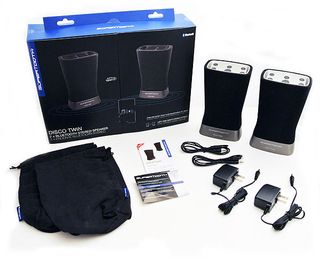
SuperTooth's Disco Twin kit is, essentially, a pair of the company's Disco 2 speakers with the right satellite wirelessly connected to the left. The bundle includes almost two of everything: AC chargers, 3.5 mm male-to-male cables, and cloth carrying pouches. You can find the kit on Amazon between $160 and $170.
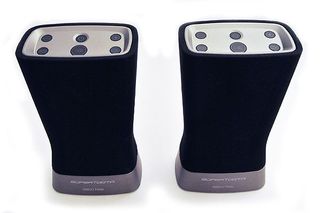
The speakers are built into a tough plastic frame. Their grille is wrapped in black cloth. Overall, the set has some weight to it, though the materials do feel a little cheap.
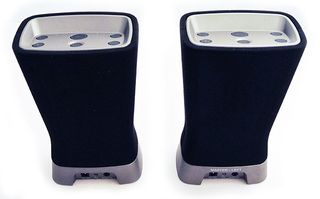
SuperTooth doesn't publish its driver specifications, but it appears that each side houses four drivers and a passive radiator. The pear-shaped towers weigh 553 grams (just under a pound), and at 7.2" x 4.3" x 2.8", carrying them around is more burdensome than the units we already reviewed. Once again, this is gym bag territory. If you'd like to get a little more portable, it is possible to use one of the enclosures on its own instead.
Connectivity And Controls
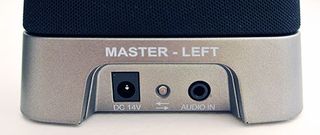
Like most of the competition, SuperTooth's Disco Twin accepts analog input through its 3.5 mm jack or a wireless Bluetooth connection. As mentioned, each enclosure can operate independently, though only the left side is outfit for both input types. The right side is limited to a wired signal through its 3.5 mm jack if you use it on its own. Listening to the two enclosures together from a wired source requires a splitter, which isn't included.
The Disco Twin paired with our smartphone quickly. There was an intermittent lag issue where audio cut out, but repeating the pairing process solved the issue. SuperTooth doesn't include a mic, and USB charging isn't supported either.
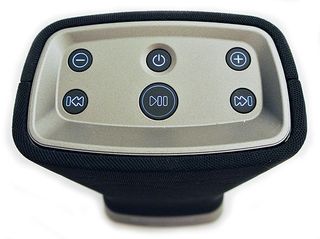
We're happy to report that SuperTooth's controls are both simple and obvious. There are six buttons on top of each speaker to turn volume down, to turn it up, to toggle power or make a Bluetooth connection, to replay a previous track, slip to the next track, or play and pause the current track. With the speaker turned on, the buttons light up. And used cooperatively, either speaker can navigate your library (though the volume controls are independent).
Subjective Sound Analysis
SuperTooth's Disco Twin is the product in our round-up that facilitates great stereo separation as you move enclosures away from each other. Unfortunately, the frequency response sounds incomplete; there's adequate bass, but some of the mids are clearly missing and the highs don't quite sound right either.
If you didn't have these other units next to you for comparison, the Disco Twin would likely sound better. But right after listening to Cambridge's Minx Go, for example, the difference is noticeable. I also ran into considerable distortion at the highest volume levels, so plan on dialing back for the best experience.
Livability And Subjective Conclusion
The ability to set satellites apart for greater stereo separation is unique to the Disco Twin, and the system retains its portability if you want to stick with one enclosure on its own. That's an unmatched level of flexibility in this round-up. Maximizing SuperTooth's kit means setting speakers on different sides of a home, filling an entire living space with music. Not possible with Bluetooth? Au contraire. The Disco Twin achieves best-in-class range, hitting 34 meters line-of-sight before dropping the wireless signal.
Plenty of volume is also a plus. Unfortunately, this kit demonstrates weaknesses along the frequency spectrum, falling short against its competition when we isolate sound quality. SuperTooth has an interesting product on its hands, though, which may appeal to customers looking to fill a space with music.
| Supertooth Disco Twin | |
|---|---|
| Power: | 2 x 16 W RMS |
| Maximum Volume at 30 Inches: | 88 dB Line-in88 dB Bluetooth |
| Speakers: | 2 x four drivers (unknown size)2 x 1 passive radiator |
| Impedance: | Not specified |
| Measured Outdoor Bluetooth Range: | 34 meters |
| Inputs: | AC charging port3.5 mm input jack |
| Outputs: | N/A |
| Controls: | Power buttonVolume up buttonVolume down buttonPause/play buttonPrevious track buttonNext track button |
| Battery: | Built-in Li-ion rechargeable battery (capacity not specified) |
| Running Time at 46 dB(A), 20 inches: | Approximately 8 hours |
| Dimensions: | 2 x 182 mm (7.2") height2 x 108 mm (4.3") width2 x 70 mm (2.8") height |
| Weight: | 2 x 553 g (0.09 lb) |
| Build Materials: | Plastic, leather, textile covering |
| Available Colors: | Black with silver-gray accents |
| Accessories: | Two AC chargers, two 3.5 mm male-to-male cables, two carrying cases, manual |
| Bluetooth: | Bluetooth 3.0A2DP (Audio sync-only) |
| Hands-Free Phone: | No |
| Microphone Sensitivity: | N/A |
| NFC Pairing: | No |
| Charging Time: | <3 hours |
| LED Indicators: | Charging and status |
| Warranty: | Two years |
| Amazon.com Price Range: | $160 to $170 |
Stay On the Cutting Edge: Get the Tom's Hardware Newsletter
Get Tom's Hardware's best news and in-depth reviews, straight to your inbox.
-
vmem whatever happened to really popular products like jambox and solemate? they're well within your price rangeReply -
DarkSable I run a firespinning troupe. When you're practicing routines, you HAVE to have loud, clear music, because the fire tools are spinning quickly, causing a massive amount of air turbulence with the flames, creating a very, very loud roar.Reply
In order to practice a routine with perhaps five other people on stage, you have to be able to hear the music to know where you are in the routine - otherwise someone might move too early or not move, and, well... bad things would happen.
When I founded the club, I was looking at all sorts of options; what I really wanted was a shop boombox, but they were expensive and didn't have the battery life I needed for practice... and couldn't be plugged in because you practice outside.
After reading a lot of reviews, I got the UE boombox. It has several features that were incredibly useful to me - most notable the fact that it could store three bluetooth profiles AND connect through a normal 3.5mm jack - that way we didn't have to just use my music collection, but could use other members' as well without them having to mail me the files.
Solutions we tried to use before was an iHome system, which didn't come close to having enough volume, and an old CD boombox... which worked fine, except the CDs got worn out pretty quickly as they were outdoors, and it was limiting on what music we could use - we had to have it beforehand.
So I got this UE boombox, and it was perfect. It doesn't have THE sharpest sound in the world, but it doesn't have distortion with everything turned to max volume, and it has solid base (so you can hear the beat clearly) and good battery life.
For anything requiring outdoor music that has to carry well or be particularly well, I highly, highly recommend the UE Boombox. (It would work perfectly for, say, a beach party, or something like that.) -
lp231 i was hoping you guys would also include the Creative Airwave.Reply
http://us.store.creative.com/B00COIHWVG/M/B00COIHWVG.htm -
thesuperguy The problem with this review is that they are basing their recommendations on the purely technical aspects that in the end, really don't contribute to sound quality. Ranking them based on features, range, and maximum volume is fine and all, but frequency range is not an indicator of quality. It is a very subjective thing.Reply -
cleeve Reply12155233 said:The problem with this review is that they are basing their recommendations on the purely technical aspects that in the end, really don't contribute to sound quality. Ranking them based on features, range, and maximum volume is fine and all, but frequency range is not an indicator of quality. It is a very subjective thing.
That's not true, sound quality is foremost when it comes to factors that contribute to our final recommendations.
Both subjective and objective measures of sound quality were taken into account.
We can't chart subjective sound quality but that doesn't mean you should assume it's unimportant. It's a huge part of the analysis.
-
cleeve Reply12154939 said:i was hoping you guys would also include the Creative Airwave.
http://us.store.creative.com/B00COIHWVG/M/B00COIHWVG.htm
We asked Creative for a sample and they declined to answer.
-
boogalooelectric I just bought one of these for $20 from MonopriceReply
http://www.monoprice.com/Product?ab3=b&utm_expid=58369800-11.KFcpHWqASSutMqNPOqaJVg.1&c_id=108&cp_id=10827&cs_id=1082704&p_id=7364&seq=1&format=2&utm_referrer=http%3A%2F%2Fwww.monoprice.com%2FCategory%3Fc_id%3D120%26cp_id%3D10827
I hooked them up to a pair of old cambridge soundworks 2.1 speakers and voila I have bluetooth speakers.
Monoprice has another for $45 that can also do NFC.
Also where is the JBL3 -
lp231 Reply12155607 said:12154939 said:i was hoping you guys would also include the Creative Airwave.
http://us.store.creative.com/B00COIHWVG/M/B00COIHWVG.htm
We asked Creative for a sample and they declined to answer.
I went to this shopping center one time and one of electronic stores has it on demo. It doesn't sound too bad, quite good actually, was about to get it, but its price was a bit steep during that time.
-
DarkSable Reply12156054 said:I hooked them up to a pair of old cambridge soundworks 2.1 speakers and voila I have bluetooth speakers.
Monoprice has another for $45 that can also do NFC.
I've got an NFC/bluetooth receiver for my stereo system as well. The trouble with that is that it requires two wall outlets to run - the idea behind these is you can take and use them anywhere. (I would consider them bluetooth boomboxes, rather than speaker systems.)
